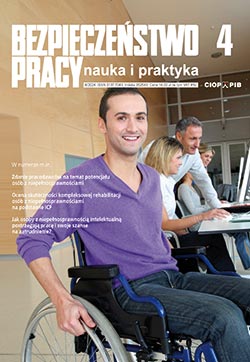Electromagnetic field emitted by radiocommunication systems – the evolution of exposure parameters in Warszawa in the 21st century
Krzysztof Gryz, Jolanta Karpowicz, Patryk Zradziński
The common use of radiocommunication systems and their dynamic development affects the exposure of people to the electromagnetic field emitted by devices operating in these systems. Due to the large number of users in the urban environment, there is the highest density of radiocommunication antennas and the electromagnetic field with the most complex frequency spectrum. The article presents the results of the recognition and assessment of exposure to electromagnetic field emitted by radiocommunication systems, based on the results of own research, characterizing the evolution of the parameters of this exposure over nearly twenty years in the center of Warszawa. The results of discussed investigations shown, that till 2020 in considered locations in public buildings and outdoor urban spaces, there was no exposure of workers to electromagnetic field in Warszawa at levels requiring a periodic inspection with respect to the labour law provisions. Discussed investigations did not cover the evaluation of locally stronger electromagnetic field exposure in the proximity of emitting antennas located usually at the building roofs or free-standing constructions.
DOI: 10.5604/01.3001.0015.0295
Employers' opinions on employing people with intellectual disabilities
Karolina Pawłowska-Cyprysiak, Katarzyna Hildt-Ciupińska
The aim of the article is to present employers' opinions towards employing people with intellectual disabilities. The possibility of employment is a chance to develop and possibility to limit the social isolation of this group. However the chance for such activity for the people of intellectual disability is low from the point of view of workers of poviat labor offices. Low level of education is the main reason for not employing people with intellectual disability. The vast majority of this group have only primary education, and only a small part has special vocational education. Despite the fact that people have a positive attitude to the professional activity of people with intellectual disability, they are not willing to employ it in their own enterprises. The aim of the questionnaire research conducted at CIOP-PIB in 2020 was to show the opinion about people with intellectual disability as workers and employers opinions toward about employment of this group. The article presents the results of these studies.
DOI: 10.5604/01.3001.0015.0298
How to develop psychological capital? Examples of interventions
Zofia Mockałło, Aleksandra Stachura-Krzyształowicz
In recent years, particular attention has been paid to employees’ wellbeing, as well as interventions aimed at maintaining or improving wellbeing. Research to date has shown that one of the ways to maintain or improve wellbeing of employees is to develop their psychological resources. The aim of the article is to present effective interventions aimed at building a personal resource, which is psychological capital.
The article presents a typology of organizational interventions and discusses the model of an intervention developing employees' psychological capital. Next, examples of interventions based on this model and other interventions effective in developing psychological capital and employees’ wellbeing are described.
DOI: 10.5604/01.3001.0015.0301
Preventive vaccinations in Poland
Małgorzata Gołofit-Szymczak, Rafał L. Górny
Vaccinations are the most effective prophylactic method in control of infectious diseases. Vaccination allows both the supervision of infectious diseases’ dissemination and, in many cases, their eradication. This paper introduces the reader to the knowledge of the history of vaccination, types of immunity and vaccines. The legal regulations concerning mandatory and recommended vaccinations in Poland were also analyzed.
DOI: 10.5604/01.3001.0015.0302
The impact of exposure to cold on manual skills of a worker using protective gloves
Magdalena Młynarczyk, Joanna Orysiak, Emilia Irzmańska
Exposure to a cold environment may have a negative effect on the worker's body. Unfavorable conditions can lead to the cooling of the distal parts as well as the body, and even to hypothermia. The following article focuses on one of the elements of the influence of the cold environment on the human body - on manual skills. It presents the influence of the cold environment on changes in hand dexterity, which in turn may translate into e.g. to increase the number of accidents, and therefore work safety.
DOI: 10.5604/01.3001.0015.0304




























